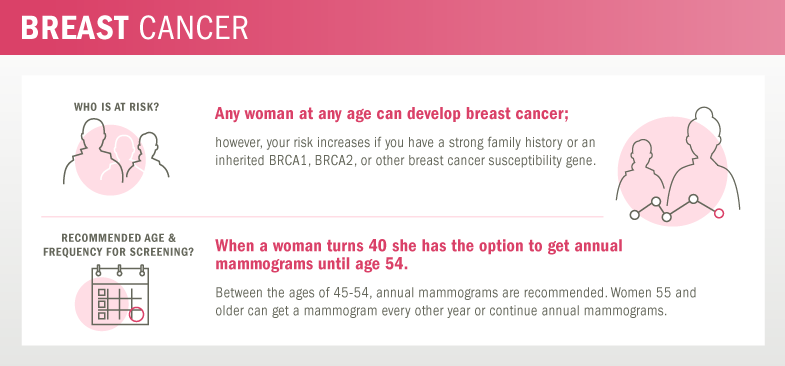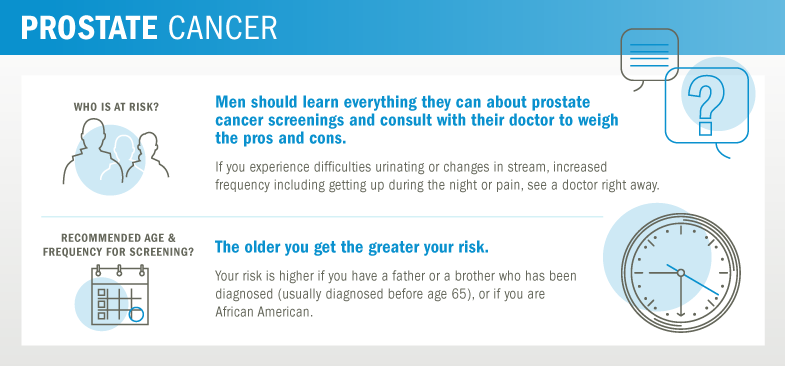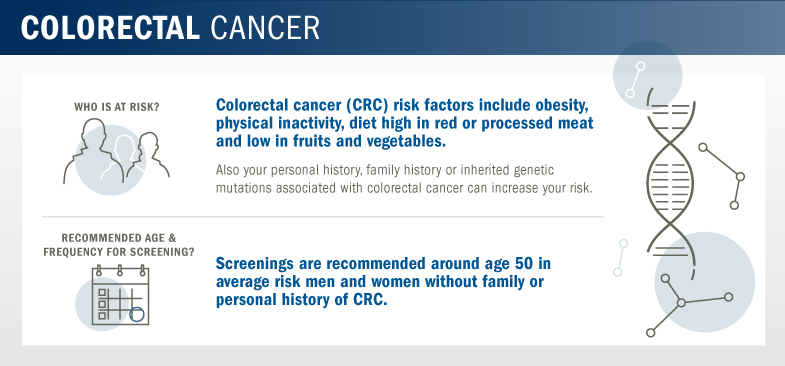The statistics are alarming. The American Cancer Society estimates there will be 1.9 new cancer diagnoses and over 600,000 cancer-related deaths in the U.S. in 2021. Every cancer is different and for some types, preventive screenings or tests can help detect cancers early, improving treatment outcomes.
Cancer screenings are the most effective way to identify certain cancers earlier, which then offers us the best possible options for treatment and most importantly: the possibility for cure.
Breast Cancer Prostate Cancer Lung Cancer Colon Cancer
Breast Cancer
 One in eight women will develop breast cancer in her lifetime. That’s why it’s especially important for those with an increased risk—due to family history or other factors—to consult with their doctor about receiving a screening mammogram before the age of 40.
One in eight women will develop breast cancer in her lifetime. That’s why it’s especially important for those with an increased risk—due to family history or other factors—to consult with their doctor about receiving a screening mammogram before the age of 40.
By taking control of your health, you are your best defense against breast cancer. And at Memorial Hermann, we’re here to stand alongside you each step of the way.
- What is a screening mammogram? Women who may be at increased risk for developing cancer include those with history of radiation therapy to the chest, genetic mutation including an abnormality in the BRCA 1/BRCA or CHD1 genes, Bannayan-Rilet Syndrome, history of lobular carcinoma in situ, or a strong family history of breast cancer. Women and men with a strong family history should consider speaking to a genetic counselor.
- Who is at risk? Any woman at any age can develop breast cancer; however, a strong family history or an inherited genetic mutation such as BRCA1, BRCA2, or other breast cancer susceptibility genes has been shown to increase risks.
- Recommended age and frequency for screening? Women of average risk for breast cancer should begin screening mammography at age 40 and continue screening annually. Those patients at increased risk for breast cancer may begin screening sooner. Women between the ages of 20 to 39 with average risk should receive a clinical breast exam once every one to three years. All women are encouraged to discuss their individual risk factors with their health care provider.
Learn More Schedule a Mammogram
Prostate Cancer
 After skin cancer, prostate cancer is the second most common cancer in men in the U.S. About one in seven will be diagnosed with prostate cancer during his lifetime, according to the American Cancer Society. Prostate cancer screenings can catch the cancer before symptoms start.
After skin cancer, prostate cancer is the second most common cancer in men in the U.S. About one in seven will be diagnosed with prostate cancer during his lifetime, according to the American Cancer Society. Prostate cancer screenings can catch the cancer before symptoms start.
- What does the screening entail? Two common tests—a digital rectal exam and a blood test, which measures the level of prostate specific antigen (PSA) are used to screen for prostate cancer.
- Who is at risk? The older you get, the greater your risk. Your risk is higher if you have a father or a brother who has been diagnosed (usually diagnosed before age 65), or if you are African American.
- Recommended age and frequency for screening? Men should learn everything they can about prostate cancer screenings and consult with their doctor to weigh the pros and cons. However, if you experience difficulties urinating or changes in stream, increased frequency including getting up during the night, hematuria, inability to void, incontinence, erectile dysfunction, weight loss, weakness or pain see a doctor right away.
In order to schedule a prostate cancer screening, we encourage you to speak with your primary care physician on what's best for you.
Find a Primary Care Physician
Lung Cancer
Lung cancer is the leading cause of cancer death in men and in women. Studies show that screening those at high risk before symptoms appear, can detect lung cancer early when it is easier to treat and more likely to be cured.
- What does the screening entail? A low-dose spiral CT (LDCT) scan is the only proven and effective way to screen for lung cancer.
- Who is at risk? Smoking causes 80-85% of lung cancer in the U.S. If you are a current or former smoker, your risk of developing lung cancer may be up to 25 times higher than someone who has never smoked.
- Recommended age and frequency for screening? Screenings are recommended for patients between the ages of 50 to 80 who have at least a 20-pack-year smoking history, currently smoke or have quit within the past 15 years, and who are in good health.
You will need an order for the lung screening from your health care provider before your exam.
Schedule a LDCT
Colorectal Cancer
 Although the incidence rates of colorectal cancer have decreased, colorectal cancer (CRC) is the third most common cancer in men and women. It is the third leading cause of death in men and third in women. The decline in incidence and death rates is due to improvement in early detection and screening.
Although the incidence rates of colorectal cancer have decreased, colorectal cancer (CRC) is the third most common cancer in men and women. It is the third leading cause of death in men and third in women. The decline in incidence and death rates is due to improvement in early detection and screening.
- What does the screening entail? There are three ways to be screened for CRC: 1) stool based testing for microscopic blood or changes in stool, 2) endoscopic evaluations such as colonoscopy or flexible sigmoidoscopy, or 3) CT colonography.
- Who is at risk? CRC risk factors include obesity, physical inactivity, diet high in red or processed meat and low in fruits and vegetables. In 2016, processed meat was classified as a carcinogen by the International Agency for Research on Cancer. Personal history, family history or inherited genetic mutations associated with colorectal cancer such as hereditary nonpolyposis colorectal cancer (HNPCC), familial adenomatosis polyposis (FAP) syndrome, or history of inflammatory bowel syndrome are also risk factors.
- Recommended age and frequency for screening? Screenings are recommend around age 45 or older in average risk men and women without family or personal history of CRC or 45 years old and 10 years younger than the age at which a first-degree relative was diagnosed with colon cancer.
Schedule a Colonoscopy




